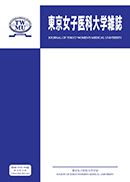Virtual Issue
Volume 88, Issue 1
Displaying 1-12 of 12 articles from this issue
- |<
- <
- 1
- >
- >|
-
2018Volume 88Issue 1 Pages Toc1
Published: February 25, 2018
Released on J-STAGE: March 06, 2018
Download PDF (90K)
Review: Malignant Tumor
-
2018Volume 88Issue 1 Pages 1-5
Published: February 25, 2018
Released on J-STAGE: March 06, 2018
Download PDF (429K)
Original
-
2018Volume 88Issue 1 Pages 6-11
Published: February 25, 2018
Released on J-STAGE: March 06, 2018
Download PDF (286K)
The 83rd Annual Meeting of the Society of Tokyo Women's Medical University: Symposium
-
2018Volume 88Issue 1 Pages 12
Published: February 25, 2018
Released on J-STAGE: March 06, 2018
Download PDF (439K) -
2018Volume 88Issue 1 Pages 13-14
Published: February 25, 2018
Released on J-STAGE: March 06, 2018
Download PDF (231K) -
2018Volume 88Issue 1 Pages 15-16
Published: February 25, 2018
Released on J-STAGE: March 06, 2018
Download PDF (185K) -
2018Volume 88Issue 1 Pages 17-19
Published: February 25, 2018
Released on J-STAGE: March 06, 2018
Download PDF (209K) -
2018Volume 88Issue 1 Pages 20-22
Published: February 25, 2018
Released on J-STAGE: March 06, 2018
Download PDF (896K) -
2018Volume 88Issue 1 Pages 23-25
Published: February 25, 2018
Released on J-STAGE: March 06, 2018
Download PDF (568K) -
2018Volume 88Issue 1 Pages 26-29
Published: February 25, 2018
Released on J-STAGE: March 06, 2018
Download PDF (386K)
Proceeding
-
2018Volume 88Issue 1 Pages 30-38
Published: February 25, 2018
Released on J-STAGE: March 06, 2018
Download PDF (588K) -
2018Volume 88Issue 1 Pages 39-41
Published: February 25, 2018
Released on J-STAGE: March 06, 2018
Download PDF (299K)
- |<
- <
- 1
- >
- >|
